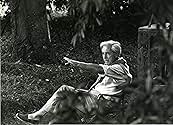Robert Bresson(1901-1999)
- Writer
- Director
- Second Unit Director or Assistant Director
Robert Bresson trained as a painter before moving into films as a
screenwriter, making a short film (atypically a comedy), Affaires publiques (1934) in
1934. After spending more than a year as a German POW during World War
II, he made his debut with Les anges du péché (1943) in 1943. His next film, Les dames du bois de Boulogne (1945)
would be the last time he would work with professional actors. From
Journal d'un cure de campagne (1951) (aka "Diary of a Country Priest") onwards, he created a unique
minimalist style in which all but the barest essentials are omitted
from the film (often, crucial details are only given in the
soundtrack), with the actors (he calls them "models") giving
deliberately flat, expressionless performances. It's a demanding and
difficult, intensely personal style, which means that his films never
achieved great popularity (it was rare for him to make more than one
film every five years), but he has a fanatical following among critics,
who rate him as one of the greatest artists in the history of the
cinema. He retired in the 1980s, after failing to raise the money for a
long-planned adaptation of the Book of Genesis.





















